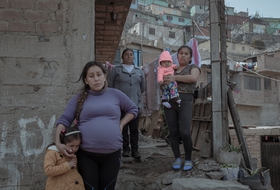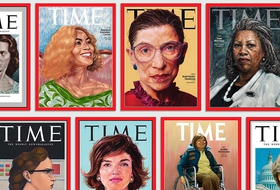
One in three women have suffered physical or sexual violence. With contributions from Europe, Africa, Asia and Latin America, we look at how this shadow pandemic affects every corner of the world.
The appointment of an openly gay Prime Minister, Ana Brnabic, in Serbia represents a turning point for this conservative country.
Ana Brnabic, 41, is Serbia’s new Prime Minister, and is openly gay. For such a conservative country – 80 per cent of Serbia’s 7.1 million citizens are orthodox Christians – this is a real turning point. Brnabic, chosen by President Aleksandar Vucic, will also be the first woman to lead the country. This move is aimed to give a more tolerant and open image of Serbia, which is trying to join the European Union (its application was filed in Brussels in 2012 and negotiations are still ongoing).
The new government will be supported by the Serbian Progressive Party, which has an overwhelming majority in the Parliament. Nonetheless, Ana Brnabic could be perceived as a risk. The newly elected Prime Minister, in fact, doesn’t boast a great political experience, as she held her first public office last year when she was appointed Minister of Public Administration. At that time the choice caused an outcry in the far right, and, similarly, today some are turning up their nose – not only among the ultra-conservatives. Dragan Markovic, the leader of one of the smaller parties in the President’s coalition, said that the new Prime Minister “should be a family man who knows what children are”.
Serbian President nominates Ana Brnabic to be the next prime minister. She’ll be the country’s first woman and first openly gay PM. pic.twitter.com/kqJKgXpWrZ
— AJ+ (@ajplus) 16 giugno 2017
Ana Brnabic has shown herself unperturbed by the attacks linked to her sexual orientation. Answering to Markovic, for instance, she only defined his declarations “inadequate, irresponsible and discriminatory”. It’s no coincidence that Brnabic grew up out of Serbia. Her academic career led her in the United States and England, where she got a degree in marketing at the University of Hull. So, she is familiar with the Western world also thanks to her professional experience in agricultural development programmes funded by the European Union and by USAid.
Ana Brnabic said that she isn’t in government “as an advocate of the LGBT community”, despite she took part in a gay pride parade in Belgrade in 2016. And she added that she doesn’t like when people use her sexual orientation to describe her character. “Why does it matter? I don’t know why it matters. What is important is whether someone is capable, professional, hard-working, honest, likes their country and wants to work in its best interest. Serving my country is the greatest honour. I will work in a devoted and responsible way with great love and honesty”.
Ana Brnabic will be Serbia’s first gay prime minister, and first female as well. Big deal for the Baltics https://t.co/KiJ0KXsZir #LGBT pic.twitter.com/S0LkOaU9HX
— LGBT+ News (@mondokoosh) 16 giugno 2017
What Vucic expects of Brnabic is a support in the difficult relationships with a neighbouring country. Brnabic is of Croatian origin and, according to international media, Serbia’s President believes this could silence some of the accusations of being too nationalist.
Siamo anche su WhatsApp. Segui il canale ufficiale LifeGate per restare aggiornata, aggiornato sulle ultime notizie e sulle nostre attività.
![]()
Quest'opera è distribuita con Licenza Creative Commons Attribuzione - Non commerciale - Non opere derivate 4.0 Internazionale.
One in three women have suffered physical or sexual violence. With contributions from Europe, Africa, Asia and Latin America, we look at how this shadow pandemic affects every corner of the world.
The Istanbul Convention against gender-based and domestic violence marks its tenth anniversary. We look at what it is, who its signatories are, and what the future might hold.
European Commission President Ursula von der Leyen reminded us of the gravity of violence against women around the world, and of the Istanbul Convention’s utmost importance.
President Erdoğan has pulled Turkey out of the Istanbul Convention, key in the fight against gender violence, claiming that it favours the LGBT community rather than family values.
Violence against women in Peru has increased as a result of Covid-19 lockdowns. 14,912 people were reported missing from January to November 2020, more than half of them minors and 64 per cent women. People have been confined to their homes for months, many forced to endure poor physical, economic and social conditions. A situation that
Joys Estefani Qqueccaño Huamani, 24, disappeared from her rural community in Peru on 9 October. Her family began looking for her independently of the authorities and despite the resistance of relatives of Joys Estefani’s ex-partner Arturo Ccana Condori, 32, charged with committing violence against her on 28 September, eleven days before Joys Estefani disappeared. Photos
Costa Rica celebrated its first same-sex marriage when two women, Alexandra Quiros and Dunia Araya, celebrated their wedding: an “extraordinary moment”.
The pandemic and its restrictions are affecting everyone, without exceptions. However factors like housing, income inequalities, gender, access to technology and working conditions are influencing how people experience the health crisis.
Time magazine’s 100 Women of the Year project sheds light on influential women’s stories, from Amelia Earhart to Greta Thunberg. A selection of some of the greats for International Women’s Day.







